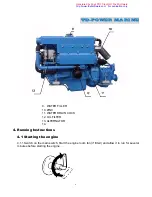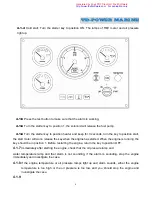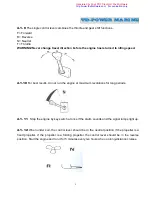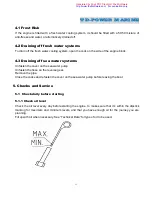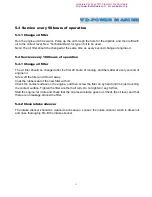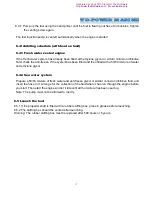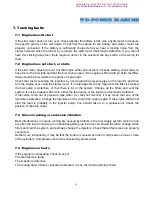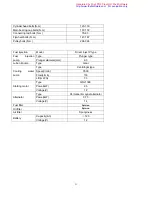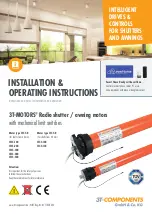
18
TD-POWER MARINE
7.
Tracking faults
7.1
Engine doesn’t start
If the start motor does not turn over, check whether the battery is flat. Use a hydrometer to measure
the specific gravity of the electrolyte. Check that the cables for the battery and starter motor are
properly connected. If the battery is sufficiently charged and you hear a clicking noise from the
starter solenoid when the starter ky is turned, the start motor itself maybe defective. If you cannot
hear this clicking noise then there maybe a defect in the solenoid, the key switch or the wiring for
them.
7.2
Engine does not start, or stalls
If the start motor does turn over, but the engine either will not start, or keeps stalling, check that you
have fuel in the fuel tank and that the fuel cock is open. If the engine is fitted with an extra fuel filter,
there should be fuel visible in the glass or metal optic.
Check that fuel is reaching the injectors by unscrewing the pressure pipe on the injector, and then
turn the engine over using the starter motor. If no fuel appears it may mean that the filter is blocked,
the fuel pump is defective, or that there is air in the system. Change all the filters and vent the
system. If not fuel appears after this, either the feed pump or the injector pump maybe defective.
If fuel does come out of pressure pipe when you carryout this test, it may mean that one of the
injectors is defective. Change the injectors and try to start the engine again. If the engine still will not
start the fault is probably in the injector pump. You should take it to a professional. Check the
position of the stop cable.
7.3
Uneven running or excessive vibration
Most interferences in engine running are caused by defects in the fuel supply system, which in turn
are often the result of water, air or impurities getting into the fuel. You should therefore change all the
filters and vent the system, and perhaps change the injectors. Check that all fuel pipes are properly
connected.
Rather more infrequently, it may be that the trouble is caused by loss of compression in one or more
of the cylinders. Compression should be checked by professional.
7.4
Engine over heats
If the engine is overheating, check to see if:
The thermostat is faulty
The impeller is defective
The cooling water intake or jackets are blocked. (if yes, dismantle and clear them)
Generated by Foxit PDF Creator © Foxit Software
http://www.foxitsoftware.com For evaluation only.



